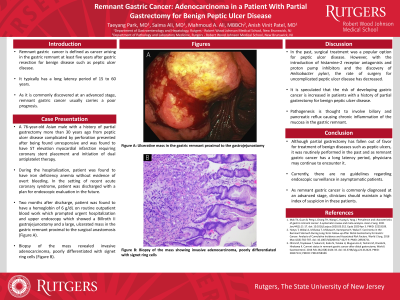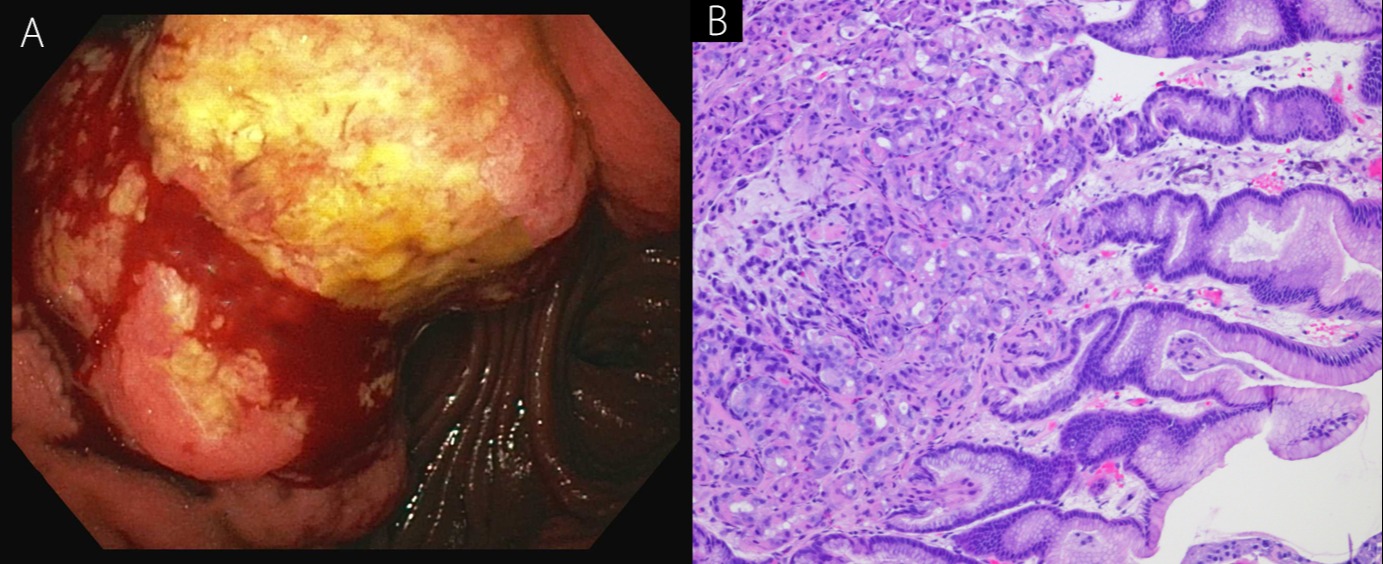Back


Poster Session C - Monday Afternoon
Category: Stomach
C0697 - Remnant Gastric Cancer: Adenocarcinoma in a Patient With Partial Gastrectomy for Benign Peptic Ulcer Disease
Monday, October 24, 2022
3:00 PM – 5:00 PM ET
Location: Crown Ballroom

Has Audio
- TP
Taeyang Park, MD
Rutgers Robert Wood Johnson University Hospital- New Brunswick
New Brunswick, NJ
Presenting Author(s)
Taeyang Park, MD, Saima Ali, MD, Mahmoud A. Ali, MBBCh, Anish Vinit Patel, MD
Rutgers Robert Wood Johnson University Hospital- New Brunswick, New Brunswick, NJ
Introduction: Remnant gastric cancer is defined as cancer arising in the gastric remnant at least five years after gastric resection for benign peptic ulcer disease (PUD). It is often diagnosed at an advanced stage and has poor prognosis.
Case Description/Methods: A 76-year-old Asian man with a history of partial gastrectomy more than 30 years ago from PUD complicated by perforation presented after being found unresponsive. Patient was found to have acute ST elevation myocardial infarction requiring coronary stent placement and initiation of dual antiplatelet therapy. Patient was also found to have iron deficiency anemia without overt bleeding. Endoscopic evaluation was not pursued during the admission and timing was to be determined in the setting of recent acute coronary syndrome and as patient’s hemoglobin remained stable. Two months after discharge, the patient’s hemoglobin was found to be 6 g/dL on routine outpatient blood work which prompted urgent hospitalization. He received transfusion with packed red blood cells. An upper endoscopy was performed that showed a Billroth II gastrojejunostomy and a large, ulcerated mass in the gastric remnant proximal to the surgical anastomosis (Figure A). Biopsy of the mass revealed invasive adenocarcinoma, poorly differentiated with signet ring cells (Figure B). He was discharged with oncology follow-up.
Discussion: We report here a case of remnant gastric cancer in a patient who had undergone partial gastrectomy many years ago. In the past, surgical treatment was a popular option for PUD, but with the introduction of histamine-2 receptor antagonists and proton pump inhibitors, role for surgery has diminished. Especially with the discovery of Helicobacter pylori and its treatment, the rate of surgery for uncomplicated PUD has decreased, but gastric resection is still performed on a regular basis for complications such as perforation and gastric outlet obstruction. Many studies claim that patients with a history of partial gastrectomy for benign PUD are at increased risk of developing gastric cancer. Pathogenesis is thought to involve biliary and pancreatic reflux causing chronic inflammation of the mucosa in the gastric remnant. At this time, there are no clear guidelines regarding endoscopic surveillance in asymptomatic patients as benefit has not been established. Nonetheless, clinicians should maintain a high index of suspicion in these patients for early diagnosis as remnant gastric cancer is commonly diagnosed at an advanced stage.

Disclosures:
Taeyang Park, MD, Saima Ali, MD, Mahmoud A. Ali, MBBCh, Anish Vinit Patel, MD. C0697 - Remnant Gastric Cancer: Adenocarcinoma in a Patient With Partial Gastrectomy for Benign Peptic Ulcer Disease, ACG 2022 Annual Scientific Meeting Abstracts. Charlotte, NC: American College of Gastroenterology.
Rutgers Robert Wood Johnson University Hospital- New Brunswick, New Brunswick, NJ
Introduction: Remnant gastric cancer is defined as cancer arising in the gastric remnant at least five years after gastric resection for benign peptic ulcer disease (PUD). It is often diagnosed at an advanced stage and has poor prognosis.
Case Description/Methods: A 76-year-old Asian man with a history of partial gastrectomy more than 30 years ago from PUD complicated by perforation presented after being found unresponsive. Patient was found to have acute ST elevation myocardial infarction requiring coronary stent placement and initiation of dual antiplatelet therapy. Patient was also found to have iron deficiency anemia without overt bleeding. Endoscopic evaluation was not pursued during the admission and timing was to be determined in the setting of recent acute coronary syndrome and as patient’s hemoglobin remained stable. Two months after discharge, the patient’s hemoglobin was found to be 6 g/dL on routine outpatient blood work which prompted urgent hospitalization. He received transfusion with packed red blood cells. An upper endoscopy was performed that showed a Billroth II gastrojejunostomy and a large, ulcerated mass in the gastric remnant proximal to the surgical anastomosis (Figure A). Biopsy of the mass revealed invasive adenocarcinoma, poorly differentiated with signet ring cells (Figure B). He was discharged with oncology follow-up.
Discussion: We report here a case of remnant gastric cancer in a patient who had undergone partial gastrectomy many years ago. In the past, surgical treatment was a popular option for PUD, but with the introduction of histamine-2 receptor antagonists and proton pump inhibitors, role for surgery has diminished. Especially with the discovery of Helicobacter pylori and its treatment, the rate of surgery for uncomplicated PUD has decreased, but gastric resection is still performed on a regular basis for complications such as perforation and gastric outlet obstruction. Many studies claim that patients with a history of partial gastrectomy for benign PUD are at increased risk of developing gastric cancer. Pathogenesis is thought to involve biliary and pancreatic reflux causing chronic inflammation of the mucosa in the gastric remnant. At this time, there are no clear guidelines regarding endoscopic surveillance in asymptomatic patients as benefit has not been established. Nonetheless, clinicians should maintain a high index of suspicion in these patients for early diagnosis as remnant gastric cancer is commonly diagnosed at an advanced stage.

Figure: A: Endoscopic image of the ulcerated mass in the gastric remnant
B: Biopsy of the mass showing invasive adenocarcinoma, poorly differentiated with signet ring cells
B: Biopsy of the mass showing invasive adenocarcinoma, poorly differentiated with signet ring cells
Disclosures:
Taeyang Park indicated no relevant financial relationships.
Saima Ali indicated no relevant financial relationships.
Mahmoud Ali indicated no relevant financial relationships.
Anish Vinit Patel indicated no relevant financial relationships.
Taeyang Park, MD, Saima Ali, MD, Mahmoud A. Ali, MBBCh, Anish Vinit Patel, MD. C0697 - Remnant Gastric Cancer: Adenocarcinoma in a Patient With Partial Gastrectomy for Benign Peptic Ulcer Disease, ACG 2022 Annual Scientific Meeting Abstracts. Charlotte, NC: American College of Gastroenterology.
